- Home
- Marge Piercy
Made in Detroit: Poems Page 2
Made in Detroit: Poems Read online
Page 2
just broken free of the eggshell.
Her hair fell over her face, a black
veil hiding her staring eyes that
sought distance and strange places.
Within her will was tempered
like fine steel by every rebuke
every insult, every beating—
a weapon she honed in dreams,
in solitude till its double-bladed
ax could knock a hole in any wall.
She held forth
The neighborhood women
always came to my mother,
never she to them. Salesmen,
solicitors, invited couples
rang the front doorbell.
The women came to the grade
door in the yard, following
the cracked cement walk around
the asbestos siding, then knocking,
calling, Bert, my mother’s full name,
or softening it to Bertie! Bertie.…
She would summon them up
the steps to the kitchen past
rows of shoe polish and garden
tools on the shelf to the side
into the kitchen with its worn
yellow linoleum and oilcloth
covered table. She would serve
tea or lemonade and they would
hold out their palms to her,
hands cracked or water-softened
with labor, a few manicured,
some twisted with arthritis
to gnarled burls. She would study
their palms and then she would
tell them what was and would
be, what to fear and what to
avoid and sometime promises
of windfalls or even love.
Again and again they came
as if she could change their
futures. Sometimes she’d give
them folk remedies for ailments
they would not tell the doctor
or hadn’t the money for him.
By four she’d shoo them out
because what she feared might
come at any moment, my father’s
bolt of temper, acid mockery.
She wiped the table and set it.
The scent of apple cake
My mother cooked as drudgery
the same fifteen dishes round
and round like a donkey bound
to a millstone grinding dust.
My mother baked as a dance,
the flour falling from the sifter
in a rain of fine white pollen.
The sugar was sweet snow.
The dough beneath her palms
was the warm flesh of a baby
when they were all hers before
their wills sprouted like mushrooms.
Cookies she formed in rows
on the baking sheets, oatmeal,
molasses, lemon, chocolate chip,
delights anyone could love.
Love was in short supply,
but pies were obedient to her
command of their pastry, crisp
holding the sweetness within.
Desserts were her reward for endless
cleaning in the acid yellow cloud
of Detroit, begging dollars from
my father, mending, darning, bleaching.
In the oven she made sweetness
where otherwise there was none.
By the river of Detroit
By the river of Detroit
I did not weep but sulked
and stormed and bit hard
into anything sweet or
succulent I came upon.
My adolescence was grey,
fogged in with prohibitions
My lust was a stunted gnarled
tree that bore onions—
fruit tough as horse chestnuts.
I would have run off
with any stranger who asked.
I beat against the walls
of my room like a rabid
bat and in my diary
I confessed madness
and amorphous sins I
could find no partner
to share. I praised suicide
and went on crossly living.
I understand those girls
who hang themselves in closets.
Wait, I want to whisper,
then run and hide and run
out of that mangling time
only jocks, pink girls and idiots
think wonderful. Get
thee to a place where
other freaks and geeks
flourish and join the dance.
The street that was
I walk down the same street
as always past the same brick
apartment house with the marble
step, past the scabby clapboard
the owners never bother to paint.
There’s the porch with plastic
geraniums, there’s the woman
with the goiter peering through
lace curtains hoping to spy
an affair or theft ripe for gossip.
There’s the house where upstairs
Dolly’s dressinggown caught fire
at the stove. I watched firemen
carrying her out. Her dog
went whimpering after them,
was left at the curb. How
could I know that cloudy morning
was the last? In my mind
those houses still stand peeling,
lace curtained, everything stuck
in a diorama of working-class
fifties while I am the bird
that has flown east, south, west,
across the ocean and back
to some place but never there.
City bleeding
Oh my city of origin, city who taught
me about class and class warfare,
who informed me how to survive
on your ashgrey burning streets
when as a Jew I was not white yet,
easy among friends of all colors,
how you have been plundered
and picked to pitted rusting bones.
Around you squat suburbs that never
saw a rat or woke to sirens cutting
machete wounds through the night,
whose lush lawns were fertilized
by your jobs exported to China,
by bodies of desperate murders.
This sand is fertile. Two years
after fire leaves a blackened pit
bushes are already sprouting
among blue and gold wildflowers.
In blocks of zombie houses, crack
houses, walls of gang graffiti,
where packs of wild dogs turn back
to wolves and the police never come,
people still try with little help
to remake community, to reach up
and out of rubble into some venue
of light, of warmth, of dignity, into
whatever peace they imagine. Out
of ruins eerie in their torn decay
where people lived, worked, dreamed
something yet begins to rise and grow.
Mehitabel & me
My junior year of college I played
a record of Archy and Mehitabel
dozens of times. I knew all
the alley cat’s lyrics. I was sure
I was her, poor, ill dressed
in a crowd of cashmere virgins
already had several lovers, a self
administered abortion, working
three jobs to stay in school, a poet
no one but myself took seriously.
Poets weren’t street sluts from Detroit.
I dressed all in black, turtleneck,
black jeans, heavy eye makeup.
Black doesn’t show dirt. Not
infrequently I was hungry. No
winter coat so I shook in the win
d
like a tree stripped of leaves. I drank
whiskey as poets were supposed to.
While good girls were locked in dorm
rooms, I wandered, partied, got laid.
I expected little but trouble. Yet
I wrote and began to win prizes.
I still expected to die young, poor
and unmourned, but with a grin,
a wry joke, in love with lady irony.
I’m middle class now and loved
in a funky house I own with money
from writing I saved to buy. I take
in cats. I drink good wine and my
own cooking. I’m still surprised.
What my mother gave me
Oh mother running an old vacuum
back and forth on a threadbare rug
while my retired father supervised—
if you had the wings of the robins,
jays and cardinals you fed daily
out of the window you’d have flown
to some garden of peach trees
and peonies, a garden of roses
and tomatoes red as lipstick:
a garden where you could sit
on cushions and cats would circle
your feet purring your Hebrew name.
Oh mother your ashes feed
wisteria rampant as your dreams
that withered to salt on your pillow.
You dreamed of love that would
bathe you in radiance and got
the lye of contempt in your throat.
Who ever looked past the faded
housedresses limp on your breasts
to the child still hungering within?
That hunger haunts me staring
from eyes of women in the subway,
women in the unemployment office
women cowering under a rain of fire,
women bruised in emergency rooms.
You are my first muse. Your pain
is my ink. I am the daughter
of your fierce lonely cry: poverty
of respect, of love, of hope.
Our neverending entanglement
How long do we mourn our mothers?
Unfinished business. Unspoken
sentences that burn on the night.
Tangled thickets of stymied
love. Steps worn smooth
with scrubbing, never to be
climbed again.
We mourn our mothers till
we ourselves are out
of breath. That umbilical
cord between us, never
really cut no matter how
hard we tried in adolescence
to sever it.
Once there was warm
milk in a sweet stream
Once there was a brush
stroking through my long
hair. Once there was a lap.
Once there was a slap.
Shards of glass.
Will anyone ever come
as close or push as
hard? As we age we
see your face mirrored.
Your diseases weaken
us. Your silences haunt,
your stories echo.
We feared becoming our
mothers yet when we were
not you, we felt guilty.
You made us even when
you hated the results
for you opened your fists
and off we flew.
Ashes in their places
I put my mother into the garden
I put my father into the sea.
Without her he complained of the fish,
the cold salt water too rough.
Without him she became
a climbing rose and rushed
up the arbor, twining, bursting
into lush pink perfumed bloom.
Gradually he swept out toward
tankers, container vessels,
a passing destroyer. He liked
their engines. He understood
engines. Women were too
emotional. He had to scare them
quiet, but ships had a purpose.
When my cats died, she welcomed
them into her bed. When I
picked her roses, she crooned
to me. I don’t need lullabies,
I said. Everybody nowadays
needs more sleep, she whispered.
I sleep much better here.
II
Ignorance bigger than the moon
January orders
Snow turns the garden white
as soap powder with blue shadows
striping the abraded furrows.
Even the pebbles in the drive
glint with ice, but inside bent
over an old coffeetable dragged
from the shed, we peruse out loud
seed catalogs, debate inflated
verbiage on tomatoes, peppers,
lettuce. What glorious photos
of polished perfect eggplants,
of even orthodontist rows
of corn kernels like model’s teeth.
Everything is super early, tasty
and resistant to all plagues
known to the studious gardener.
Surely we’ll be buried in squash.
No cuke beetles will nibble on us.
Our harvests are blessed in advance
by glossy pages of promises
that seduce us to order too much
of what will endure weeks of rain,
a month or two of drought, beetles,
chipmunks, deer, hail and hurricane
before we plop it into our mouths,
the freezer, the frying pan, or, alas,
rotting into the compost pile.
We have come through
The faintest paring of moon rises
tonight just barely silvering the mounds
of snow that used to be cars, fenceposts,
bushes, a wheelbarrow perhaps.
The world has become anonymous
everything painted and padded white
the road the same as the field it ran
through, the tallest bushes bowed.
We are stuck here without exit,
barricaded into silence. The wind
that pelted the windows opaque
that broke the white fir at its base
that pushed tiny crystal knives
sideways and froze birds on their
perches has slunk away to sea
where it harries ships and gulls.
We will dig out. We will clean up.
A plow will come and recreate
the asphalt road. Town will awake
into lights and people will meet
and ask, how was the storm for you?
How long were you without power?
Trees down? We the survivors
cautiously examine our luck.
How I gained respect for night herons
It was shortly after dawn.
We were passing an inn closed
for the season when I yelled
“Stop!” I’ve often heard night
herons squawking hoarsely
or the screech of a murder
victim deep in the marsh.
Seldom do I see them. They
hunch on dead trees like old
men in cold weather. But
this black crowned night heron
was standing in the driveway
of the inn engaged in mortal
battle with a five-foot-long
water snake twisting, striking
him whose impulse was to fly off
from us but here was a huge meal.
Breeding season. A nest of young
gaping for food. It stood its ground
the snake grasped in its beak
shaking it, biting into it, lashed
by the long muscular tail. We
crept close eno
ugh to see
the heron’s bright red eyes
polished buttons glinting fiercely.
It was an epic battle, Laocoon
encircled by serpents, but here
he was winning, barely. Not
a commanding figure, squatter than
most herons, drably plumaged
not the sort of bird we’d cast
as hero, but he wouldn’t give up.
At last he cut through the spine
and slowly overloaded made his
way flying low toward his home.
Remnants still visible
Robins migrate, all schoolchildren
learn but here on the Cape, every
winter a flock forms and stays,
long frigid months after their
compatriots have flown south.
They live deep in the woods on
hips and berries wizened by cold.
Sometimes they appear here
among the feeder birds, one
or two almost outcasts.

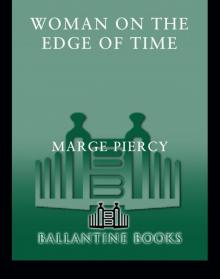 Woman on the Edge of Time
Woman on the Edge of Time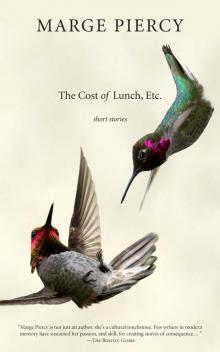 The Cost of Lunch, Etc.: Short Stories
The Cost of Lunch, Etc.: Short Stories Made in Detroit: Poems
Made in Detroit: Poems Sleeping With Cats
Sleeping With Cats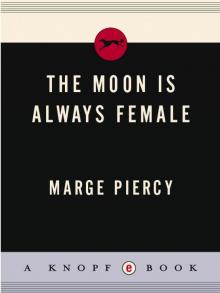 Moon Is Always Female
Moon Is Always Female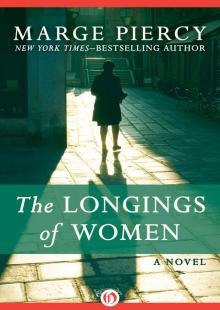 The Longings of Women
The Longings of Women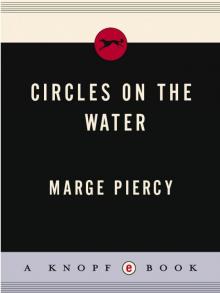 Circles on the Water
Circles on the Water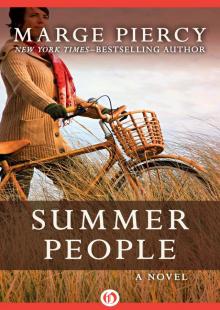 Summer People
Summer People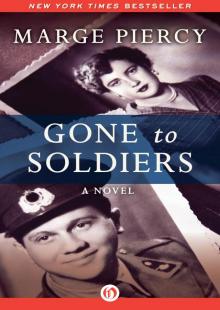 Gone to Soldiers: A Novel
Gone to Soldiers: A Novel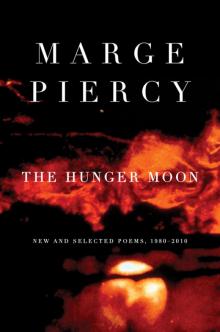 The Hunger Moon: New and Selected Poems, 1980-2010
The Hunger Moon: New and Selected Poems, 1980-2010 Vida
Vida Fly Away Home
Fly Away Home He, She and It
He, She and It So You Want to Write
So You Want to Write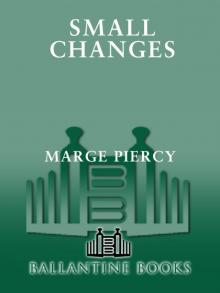 Small Changes
Small Changes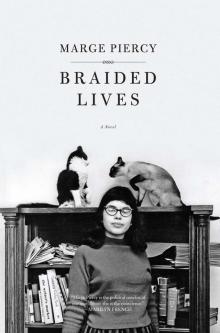 Braided Lives
Braided Lives Lord Valentine's Castle
Lord Valentine's Castle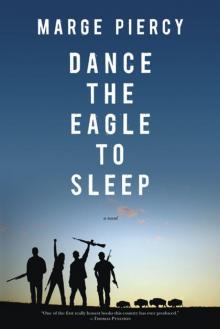 Dance the Eagle to Sleep
Dance the Eagle to Sleep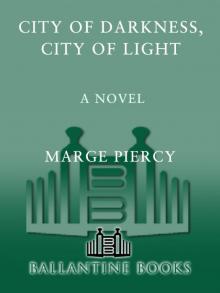 City of Darkness, City of Light
City of Darkness, City of Light The High Cost of Living: A Novel
The High Cost of Living: A Novel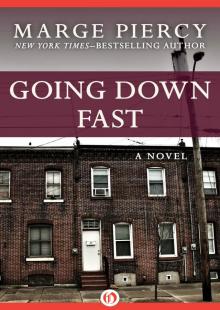 Going Down Fast: A Novel
Going Down Fast: A Novel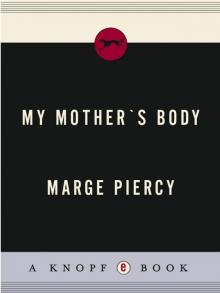 My Mother's Body
My Mother's Body Storm Tide
Storm Tide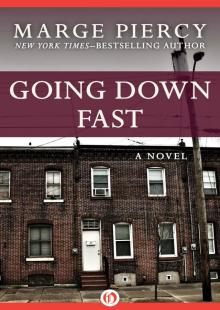 Going Down Fast
Going Down Fast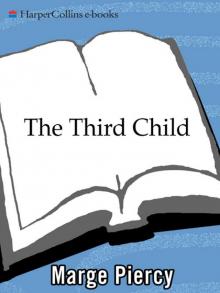 The Third Child
The Third Child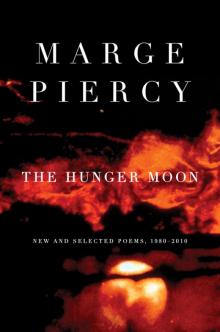 The Hunger Moon
The Hunger Moon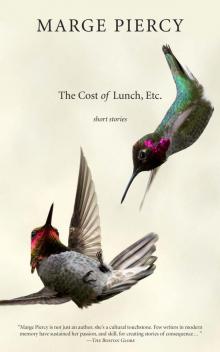 The Cost of Lunch, Etc.
The Cost of Lunch, Etc. Sex Wars
Sex Wars The High Cost of Living
The High Cost of Living Made in Detroit
Made in Detroit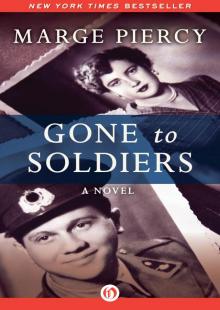 Gone to Soldiers
Gone to Soldiers